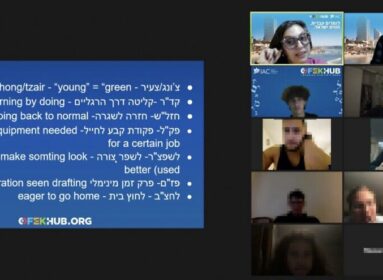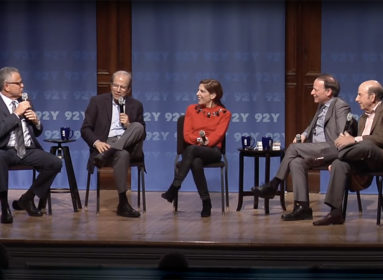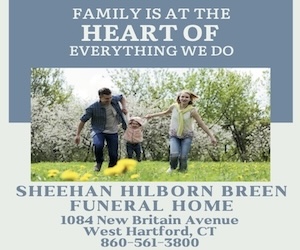Jewish Eastern Fairfield County regroups
By Cindy Mindell
BRIDGEPORT – This September marks the 50th anniversary of the JCC of Eastern Fairfield County at 4200 Park Ave. in Bridgeport. And this year is significant for another reason: the JCC building, which has also been home to UJA/Federation of Eastern Fairfield County – collectively known as Jewish Center for Community Services (JCCS) – is closing its doors to make way for a new Jewish community campus complex in partnership with Jewish Senior Services. When it is completed in two years or so, the new facility is designed to house Jewish Home nursing, assisted-living, and rehab facilities, as well as senior outreach services, children’s daycare, a fitness center and swimming pool, and new office space for the Jewish Federations of Eastern Fairfield County and Westport Wilton Weston Norwalk.
On August 16, the last day of programming in the current building, JCCS president and CEO Steve Wendell wrote in an email blast, “We are excited about the future and the potential to create a whole new culture of energy and collaboration at 4200 Park Avenue. But for today at least, it would be an injustice not to recognize the loss of something that has been very precious to us as individuals, to the Jewish community, and to the greater Bridgeport area community since September 22, 1963, and for 50 years prior to the dedication of this current building at three other locations in Bridgeport.”
As Wendell was putting together the email, he could hear strains of “Tomorrow” from Annie as the JCC day campers were preparing for their final talent show. The coincidence was not lost on him; he has spent the last few months mourning the building closure with countless community members while reassuring them that there is a new chapter ahead.
A Darien native, Wendell arrived at what was then the Bridgeport JCC fresh from the University of Iowa and U.S. Air Force in 1968. He spent 10 years as youth director there, and the next 10 years in Hazleton, Pa. as director of the JCC, Jewish Federation, and Jewish Center Youth Group. After a briefer stint at the newly merged JCC and Jewish Federation in Charleston, S.C., he spent 10 years in Pittsburgh, first as regional director of the Jewish National Fund and eventually as director of the JCC. In 1995, he returned to the Northeast, where he worked as director of camping and American programs at Young Judaea in New York. In 2010, after three years as director of the Workmen’s Circle Lodge and its summer camp, and another three as director of development at Ezra Academy in Woodbridge, he got the chance to come back to where he’d started.
With a 45-year perspective on the local Jewish community, Wendell spoke with the Ledger about helping to shepherd the reorganization of Jewish Eastern Fairfield County.
Q: What was the plan when you came back to the JCCS in 2010?
A: The core leadership of JCCS was very open with me about their plans to close the building and find a way to transition from the outdated building that the community could no longer afford to support.
They envisioned at that time to sell to Sacred Heart University (SHU). The Jewish Home was looking at other sites. Not too long after I came, after the SHU contract arrived, they started playing with several possible scenarios: Jewish High School of Connecticut, Sacred Heart University, and the Jewish Home.
JCCs in markets our size struggle and have to do a lot of work in the corporate community to keep the vibe with the help of major donors. If you look at a Cleveland or a Detroit, you see major donors who support those agencies. The only way some smaller communities remain viable is with the help of a heavy non-Jewish presence. The only way ours would have had an opportunity to keep going was with a major presence of the non-Jewish community. In fact, the JCC did serve as a community center for the north end of Bridgeport. A lot of people I deal with in the community remember the JCC fondly as the community center that was better than recreational centers in the rest of the city.
If Federation is pouring money into the building, and United Way and the State of Connecticut stop funding us, you have to address the question of who supports the building when you can join a fitness center for $10 or $19 a month, because the building can’t run on that kind of model. As a Jewish Community Center, you lose sight of your Jewish mission – and is the Jewish community going to support a general community center?
In that case, you have to address questions like, do we open on Shabbat? When I worked in JCCs and Jewish Federations in other communities, my position was the same: philosophically, I don’t have a problem with being open on Shabbat; it’s a business decision. But the Jewish community has to be ready, and that means involving the rabbis and communities and finding a common comfort level. If it doesn’t work as a business decision, it becomes a negative if the community isn’t ready for it.
If we take the region covered by UJA/Federation WWWN and our Federation, we have a community of 20,000 Jews. Can that support all these independent kinds of organizations? No, and that’s the realization coming about today in our Jewish community. We have to find a better way. It doesn’t mean that the need’s not there or the organization can’t serve the community, but there’s been an evolution and we have to determine what the community needs and what it will support.
The key to any JCC-type facility is that, when it was serving the real needs of the Jewish community first and foremost, then you could make the case at an allocations meeting. But if you’re serving the needs of a mixed or general community, it’s harder to make that case, especially when Federations are struggling with raising money.
There are no barriers for Jews any more: you don’t need a Jewish basketball league, you don’t need a place where Jewish adults and kids feel comfortable because the community today feels different, and that’s a real challenge to a JCC trying to survive under its original mission.
Q: The JCC has long offered programs to everybody from preschoolers to seniors. What is happening to this programming?
A: Our early childhood teachers have found placement in other area early childhood programs. The Jewish Home has employed some maintenance staff. I laid off 150 part- and full-time people in the last year and we tried our best to find placement and to be supportive. Early childhood kids have transferred to programs at various synagogues and at the Jewish Home; Congregation B’nai Israel has expanded its hours. Congregation Rodeph Sholom [Bridgeport] will house Merkaz Community High School for Judaic Studies, the Israeli Young Emissary program, and PJ Library. We worked out arrangements with area fitness locations for JCC members.
A lot of our programs are moving to the JCC of Greater New Haven. They have offered to incorporate kids from our day camp next summer, and we are looking to provide transportation from Eastern Fairfield County. Alison Lurie, our program director who runs the day camp, is now a program coordinator at the New Haven JCC. Our JCC Schoolboy/Schoolgirl [basketball] Classic is moving to the New Haven JCC as well, with a Bridgeport-area committee in place and volunteers from New Haven.
We donated fitness equipment to the Bridgeport high schools’ athletic departments, and much of our furnishings and other equipment to area synagogues, Tower One/Tower East senior apartments in New Haven, the JCC of Greater New Haven, the Fairfield Y, several area churches, Kids in Crisis children’s shelter in Greenwich, and other area not-for-profit programs that will benefit from the use of this equipment. In keeping with the mission of the JCC, we continue to enhance the lives of the people in our community.
The building cornerstone was taken out in late August and we’ll see whether there’s a time-capsule inside. The Holocaust memorial statue is in onsite storage, along with the Jerusalem stone; both will be placed in a memorial garden at the new facility.
Q: This transition is bittersweet: a historic building is closing, but a new one will be constructed on the same site. How do you see this development through the lens of 45 years in the community?
A: I tell people that we are not closing; we are reinventing ourselves on a new campus. There’s an impact that comes with an organization like the JCC closing. It’s a negative on the health of the entire community. With every synagogue that closes, there’s a ripple effect, because that community or neighborhood that has a synagogue supports real cultural diversity.
So the fact that we’re rebuilding on that site helps in this whole reinvention and vibrancy of the Jewish community in the area. The new building will represent on Park Avenue, in a very visible way, a new presence of the Jewish community and a new investment of the Jewish community in the general community in a way that responds to people’s needs. The result will be a rejuvenation of the presence of a strong, visible Jewish community.
It’s dramatic that the JCC is closing because the location represents something special and historic, and showcases the strength and diversity of the community. You lose that building and you lose more than just the physical structure, and people are reminded of those shuttered buildings in downtown Bridgeport. The fact that we’ve found a way to rebuild it, with more services, it will have a significant effect on the community.
The site is still central to the area Jewish community. There’s also a density of Jews in Bridgeport because of several apartment buildings along Park Avenue, which are attracting Orthodox families and retirees. You’re seeing a growth, albeit not necessarily young families, but some young Orthodox families, in the Park Avenue area. I don’t have a crystal ball but there might be a time when we need to have a full-service JCC or a Jewish cultural center back in the community.
Q: What are the next steps for Jewish Eastern Fairfield County?
A: Soon after I returned in 2010, the UJA/Federation of Eastern Fairfield County board helped launch the Thriving Jewish Community Initiative (TJC), a community-building process based on the question, what’s next for Jewish Eastern Fairfield County? A number of scenarios came out of the first community-wide meeting in October 2010. The full TJC report was adopted by UJA/Federation in May 2012; now it’s a matter of implementing it and reaching back to the people who helped design the scenarios. All scenario co-chairs have been invited to help put together a plan for the future, together with UJA/Federation. Synagogue presidents have begun to meet, and committees are being formed to develop the various scenarios. There’s a leadership-development meeting coming up in November.
People are experiencing real loss, and our task is to get across the fact that there’s the loss of the physical building, but not the loss of the Jewish community. That’s what the TJC accomplished, by tapping into what people really wanted to see in their Jewish community.
Our Federation has begun to work with UJA/Federation Westport Weston Wilton Norwalk and will share their offices during construction of the new campus. With the two Federations together, you have a community of 20,000 Jews – the largest Jewish community in Connecticut – and a community that should be able to do some really good things and support itself in a really vibrant way, as opposed to piecemeal activity.
Comments? Email cindym@jewishledger.com








 Southern New England Jewish Ledger
Southern New England Jewish Ledger










